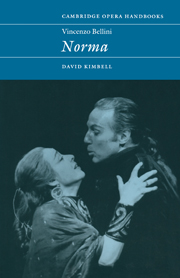Book contents
- Frontmatter
- Contents
- List of plates
- General preface
- Dedication
- Preface
- A note on Italian prosody
- A note on the vocal score
- 1 The composition of the opera
- 2 Medea – Velleda – Norma: Romani's sources
- 3 Synopsis and musical frame
- 4 Music and poetry
- 5 A glimpse of the genesis of the opera
- 6 Some variant readings
- 7 Contemporary reactions to Norma
- 8 Critical fortunes since the Unification of Italy
- 9 Five prima donnas: contributions to a performance history
- Appendices
- Notes
- Bibliography
- Index
9 - Five prima donnas: contributions to a performance history
Published online by Cambridge University Press: 05 June 2012
- Frontmatter
- Contents
- List of plates
- General preface
- Dedication
- Preface
- A note on Italian prosody
- A note on the vocal score
- 1 The composition of the opera
- 2 Medea – Velleda – Norma: Romani's sources
- 3 Synopsis and musical frame
- 4 Music and poetry
- 5 A glimpse of the genesis of the opera
- 6 Some variant readings
- 7 Contemporary reactions to Norma
- 8 Critical fortunes since the Unification of Italy
- 9 Five prima donnas: contributions to a performance history
- Appendices
- Notes
- Bibliography
- Index
Summary
In any performance in Bellini's masterpiece, Norma's is the role that counts. Pollione ranks with Pinkerton among the most graceless tenors in the repertory; Adalgisa, whose exquisitely tender and passionate role was downgraded by Bellini in a seemingly definitive revision of the opera soon after its first publication, disappears entirely from the scene as the drama approaches its climax; and Oroveso's part is less imposingly monumental than it might have been, for Bellini trimmed it out of consideration for an artist in fragile health. None of this is to imply that these roles do not need musical and imaginative singing. But no other full-length opera in the repertory depends so heavily and mercilessly for its success on the prima donna.
Bellini composed Norma for Giuditta Pasta, the woman he once called an ‘encyclopaedic angel’ (letter of 28 April 1832). And that meant that the role was calculated to explore and challenge the voice, and to extend to its very limits the art, of the greatest singer of the age. The role has come to be seen as ‘the very acme of the soprano's repertory … more challenging than Brünnhilde or Isolde’ (Christiansen 1984, p. 66), ‘ten times as exacting as Leonore’ in Lilli Lehmann's judgement (Porter 1979, p. 154). Toscanini, who shared the widelyheld conviction that Norma was the masterpiece of the bel canto repertory, never performed the opera because, in Tullio Serafin's view, ‘he never found a soprano who could adequately realize the protagonist he had in mind’ (quoted in G. R. Marek, Toscanini, New York 1975, p. 63).
- Type
- Chapter
- Information
- Vincenzo Bellini: Norma , pp. 107 - 119Publisher: Cambridge University PressPrint publication year: 1998



